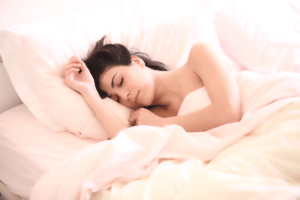Have you been having trouble getting to sleep or staying asleep?
You are not alone!
In fact, 1 in 2 adults in Canada have trouble sleeping.
This could be from things like stress, a poor sleep environment or maybe even a sleep disorder like sleep apnea.
While some people may depend on sleeping pills to get them to sleep, there are natural ways to get more sleep; keep reading to find out what they are!
Table of Contents
Cut back on your caffeine intake
This includes things like coffee, tea, energy drinks and even soda.
While they may keep you awake during the day, they are also keeping you up at night.
Caffeine is actually a type of drug, a stimulant that is meant to promote alertness.
While caffeine is okay in moderation, particularly in the morning, many people don’t realize the effect caffeine has on your body.
Studies have shown that consuming caffeine as far out as 6 hours before bed can cause you to lose a whole hour of sleep at night.
Try to limit your caffeine intake to 250mg a day in the morning.
You can switch to decaf later on if you are only drinking coffee for the taste.
Cut back on smoking and drinking alcohol
Although alcohol and nicotine can be sedative, they both can also be a stimulant like coffee.
Some studies have shown that drinking or smoking can actually be worse on your sleep than coffee.
Nightly nicotine use within four hours of going to bed was shown to reduce people’s sleep by 40 minutes at night.
Similarly, drinking before bed was shown to significantly reduce people’s amount of REM, or deep, sleep throughout the night. Drinking less and smoking further away from when you want to fall asleep will help with being able to sleep properly.
Reduce technology use before bed
You may not realize it, but the light from your electronics like your phone, laptop, television or tablet, can impact the way you sleep.
This is because the light is blue light which is the worst type of light for you at night time.
While blue light is fine during the day, it can trick your brain into thinking it is still daytime at night.
This means your body won’t produce the necessary hormone, melatonin, which you need to relax you to fall asleep.
Stop using any electronics 1-2 hours before you want to sleep to help your body naturally produce melatonin.
Improve your sleep environment
Your bed should only be for sleeping. If you lay or sit in your bed during the day, it can be harder for your body to recognize that it’s time to sleep when you go to bed at night time.
Similarly, if your bed or bedroom is not comfortable, it will be harder to fall asleep.
Make sure you have a comfortable mattress by changing it every 8 years to keep its shape.
You can easily buy a new mattress online, read more here.
You can also get products in your room to make it more comfortable like a fan to keep the room cool and keep air circulating.
If your room is too bright, getting blackout curtains may help.
Get your body moving – exercise!
Though it may be hard to find the time to do it during the day, exercise can greatly improve your ability to sleep at night.
It is recommended to exercise 4- 5 times a week for at least 30 minutes in order to improve your sleep quality.
Studies have shown that physical activity improved sleep quality in adults that were previously sedentary.
Just make sure you don’t exercise too close to when you want to fall asleep.
Exercising can make you more alert, so try to exercise 1 to 2 hours before bed so your body has time to wind down.
Create a sleep schedule
Most people tend to function better if they have a schedule or routine to follow, the same goes for falling asleep.
Try to create a bedtime routine.
This can consist of turning off your electronics, maybe reading or meditating to wind down, then getting ready for bed by brushing your teeth or doing a skin care routine.
Your bedtime schedule can include whatever you want, the point is that you do it nightly to get your body ready to fall asleep.
Our readers found these articles useful; How to Prevent SIDS, Daytime Sleep Tips for your Babies , Baby and Toddler Sleep Tips, Top Tips for Creating the Perfect Eco-Friendly Nursery , A Baby Friendly Home and Top 9 Tips to Sleep Well.








